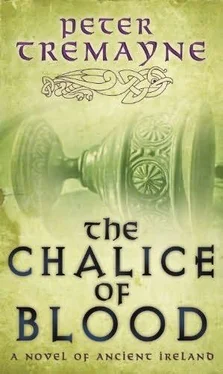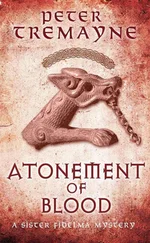Peter Tremayne - Chalice of Blood
Здесь есть возможность читать онлайн «Peter Tremayne - Chalice of Blood» весь текст электронной книги совершенно бесплатно (целиком полную версию без сокращений). В некоторых случаях можно слушать аудио, скачать через торрент в формате fb2 и присутствует краткое содержание. Жанр: Исторический детектив, на английском языке. Описание произведения, (предисловие) а так же отзывы посетителей доступны на портале библиотеки ЛибКат.
- Название:Chalice of Blood
- Автор:
- Жанр:
- Год:неизвестен
- ISBN:нет данных
- Рейтинг книги:5 / 5. Голосов: 1
-
Избранное:Добавить в избранное
- Отзывы:
-
Ваша оценка:
- 100
- 1
- 2
- 3
- 4
- 5
Chalice of Blood: краткое содержание, описание и аннотация
Предлагаем к чтению аннотацию, описание, краткое содержание или предисловие (зависит от того, что написал сам автор книги «Chalice of Blood»). Если вы не нашли необходимую информацию о книге — напишите в комментариях, мы постараемся отыскать её.
Chalice of Blood — читать онлайн бесплатно полную книгу (весь текст) целиком
Ниже представлен текст книги, разбитый по страницам. Система сохранения места последней прочитанной страницы, позволяет с удобством читать онлайн бесплатно книгу «Chalice of Blood», без необходимости каждый раз заново искать на чём Вы остановились. Поставьте закладку, и сможете в любой момент перейти на страницу, на которой закончили чтение.
Интервал:
Закладка:
‘I did so,’ the stableman replied.
‘I just wondered if you knew where that building was located?’
‘It was in the country of the Uí Dúnlainge,’ Brother Echen replied immediately. ‘In the south of the kingdom.’
‘Can you be more specific?’
Brother Echen thought for a moment and then shrugged. ‘Alas,’ he said after a moment or two, ‘all my cousin knew was that it was a chief who lived on the southern coast. Anyway, it was some ten years ago. Glassán was not held directly responsible; he was deemed to have neglected his contractual duty by not overseeing the work and then trying to blame others.’
Fidelma was about to ask another question when Cumscrad emerged from the refectorium with Abbot Iarnla. Brother Echen, with a muttered apology, hurried into the stables and returned with the chief’s horse and led it across to him.
‘Do you think that it is more than a coincidence that Brother Donnchad went to this library and that a copy of the book he was interested in was later stolen?’ asked Eadulf quietly as they mounted up
‘I do not believe in such coincidences, Eadulf,’ replied Fidelma. ‘But let us keep this between ourselves.’ She glanced at Gormán; the young warrior was pretending to be absorbed in adjusting his horse’s bridle. ‘We’ll explain later, Gormán.’
‘I notice that Cumscrad does not call his scriptor by the Latin title,’ Eadulf said.
‘The library of Fhear Maighe is still a secular one.’
While the religious had taken over many of the professions, there were still some secularists fulfilling the roles of poets, doctors, lawyers and other official functions, and many libraries remained unattached to the new abbeys.
‘That surprises me. I would have thought that Fhear Maighe was too remote to have a library, particularly one that is notpart of a religious institution. I thought that the members of the Faith now controlled all the intellectual pursuits.’
‘It would be a sorry day if everyone agreed on how we should think or what we should do,’ responded Fidelma. ‘There would not be much individuality left in the world. But there is a curious pattern emerging here. Brother Donnchad wanted to see a copy of Celsus’s work. Brother Donnán tells us that he saw a response to that work by Origenes but that work has been sent to Ard Mór abbey. Cumscrad says the original of Celsus’s work is in Fhear Maighe, but that a copy on its way to Ard Mór has been stolen.’
‘Isn’t Ard Mór in the territory of the Uí Liatháin?’
‘It is in the territory of the Déisi but stands on the opposite side of the river to Uí Liatháin territory — the same Great River that flows from here.’
‘I wonder how Brother Donnchad heard or knew that Celsus’s book was at Fhear Maighe,’ mused Eadulf. ‘What about the other book — the poems of Dallán Forgaill?’
‘It is of no consequence. The thieves were after the work by Celsus, I am sure. Dallán’s poems are no danger to the Faith.’
At that moment Cumscrad came trotting towards them on his black mare.
‘Ride alongside me, Fidelma. My warriors are waiting outside the abbey to escort us.’
Indeed, just outside, a group of half a dozen warriors were sitting on a grassy knoll indulging in a game of chance which involved throwing dísle , or dice. They scrambled to their feet when they saw their chief and hurriedly set about collecting their horses, which were tethered nearby. Within moments two of them had placed themselves at the head while the others fell in behind and the entire party was on the road, riding due west.
The afternoon’s ride passed pleasantly enough and the groupkept a fairly good pace leaving Lios Mór on the roadway that ran along the south bank of The Great River. Fidelma rode with Cumscrad, with Eadulf and Gormán behind. The pace was comfortable even for Eadulf. He enjoyed the ride in the mild afternoon sunshine. The hills to the south of them looked peaceful, large and rounded with thick woods carpeting them. There were plenty of rivulets and streams that tumbled and gushed down these hills to empty into The Great River, An Abhainn Mhór. There was no shortage of places to water the horses.
‘I can see why you call it simply The Great River,’ Eadulf observed, nodding towards the flowing water. ‘It’s large enough. Though in truth I have seen broader rivers in my travels.’
Gormán grinned, shaking his head, and replied, ‘It is not named because of its width, Brother Eadulf.’
‘Then it must be its length, for I understand it rises in the mountains a far distance to the west and bends southwards, flowing down to the sea.’
‘Again, not so, my friend,’ the warrior replied. ‘It is called The Great River as a euphemism. It is not its real name.’ Eadulf gave him a questioning glance and Gormán continued: ‘In the old days, before the coming of the new Faith, the river was called the Nemh, which meant immeasurable, sacred and heavenly. In that lies its greatness.’
Eadulf recognised the word, which also applied to a saintly person. ‘A sacred river?’
‘Many of the rivers in this land are named after the old gods or goddesses. They are dedicated to sacred deities.’
‘That is the custom in many countries I have visited,’ Eadulf said.
‘I have not travelled beyond the Five Kingdoms,’ Gormán replied regretfully. ‘But my people regard some rivers or places as being so sacred that their real name is never mentioned.As with The Great River here. There is a geis upon speaking its name.’
‘I have heard of the geis . Isn’t it a prohibition or taboo which, if broken, results in serious consequences?’
‘Yes.’ Gormán smiled grimly. ‘Breaking a geis could result in death or bring misfortune on your family.’
‘I had not realised that it could apply to uttering certain names.’
‘Very much so. For example, the sun and moon were considered sacred objects in the old days and their real names were names of gods. But the Druids forbade those names to be used, so we have several terms for them. For example, as you well know, we call the moon simply “the brightness”, or “the queen of the night”, and many more names besides. No one is allowed to call it by the name of the goddess it represents.’
‘So we can be sure that this river was named after a powerful pagan god?’
‘Yes. I have heard that along its great length there are still spots where people gather to make obeisance to the spirits of the river.’
They were approaching a large hill to the south, which Gormán told him was called the Hill of the Stone Ridge because of its obvious feature. Just before this point, the track they were following meandered away from the river. The river’s path came directly from the north for awhile but the track continued west through thick forests.
Suddenly one of the leading warriors gave a cry and pointed with his outstretched arm.
Some distance away to the south a band of horsemen was riding swiftly across the hills. They were a dozen or more. They were heading towards the south-east.
‘Warriors,’ muttered Cumscrad with narrowed eyes. ‘Uí Liatháin, from the colour of the battle emblem their leader is carrying.’
Fidelma stared at the distant riders. Their small party had halted and they heard a distant shout. The warriors had seen them and the leader had halted them in turn.
‘We are not enough swords to hold them, should they attack, lady,’ called Gormán. ‘Two, perhaps three, to one.’
The warrior band was still for a moment or two, seeming to return their observation.
‘Be prepared to ride,’ called Cumscrad, for he realised that discretion was the better part of valour.
Читать дальшеИнтервал:
Закладка:
Похожие книги на «Chalice of Blood»
Представляем Вашему вниманию похожие книги на «Chalice of Blood» списком для выбора. Мы отобрали схожую по названию и смыслу литературу в надежде предоставить читателям больше вариантов отыскать новые, интересные, ещё непрочитанные произведения.
Обсуждение, отзывы о книге «Chalice of Blood» и просто собственные мнения читателей. Оставьте ваши комментарии, напишите, что Вы думаете о произведении, его смысле или главных героях. Укажите что конкретно понравилось, а что нет, и почему Вы так считаете.











